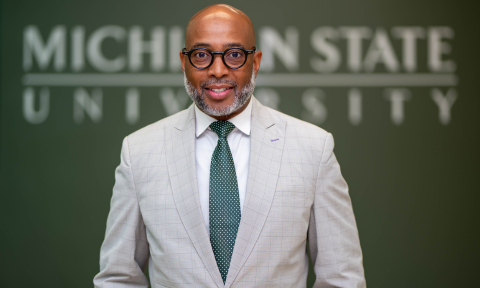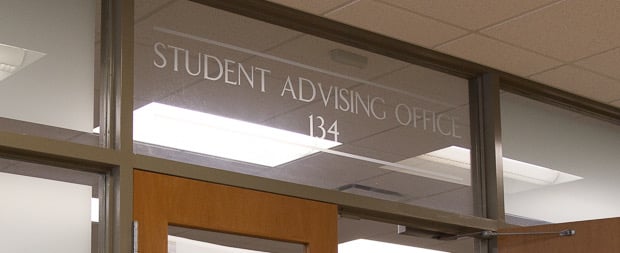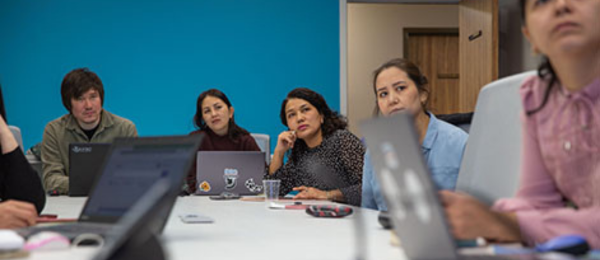Celebrating Michigan EPFP’s 50 Years and the Conclusion of the 2024-25 Program
During the 1975-76 school year, five education professionals came together under the leadership of Lansing Superintendent Carl Candoli and Lansing Deputy Superintendent Matthew Prophet, in consultation with Keith Goldhammer, then Dean of the College of Education at Michigan State University, as part of the inaugural Michigan Education Policy Fellowship Program (EPFP) cohort. These program pioneers gathered with minimal certainty of how this experience would play out in advancing their understanding of “state- and national-level education policymaking” and “develop[ing] their leadership skills” (“Michigan EPFP: Celebrating Twenty Years of Success”; “Celebrating 40 Years of Success, Michigan EPFP 1975-2015”). That said, they jumped into the experience, setting off a chain reaction of events that would sustain and grow this professional learning and leadership development opportunity for decades to come. This year, some of the fruits of the labor of these individuals, Michigan EPFP’s current and former coordinators, and the program’s almost 1,300 alums were on display with the graduation of 33 2024-25 Fellows and a celebration of the last 50 years of Michigan EPFP. A review of these Fellows’ experiences over the last ten months helps illustrate the extent to which this program has grown since its inception and how much it has offered participants every year since then.
Any recollection of where the 2024-25 Michigan EPFP experience, facilitated by the Office of K-12 Outreach in partnership with the Institute for Educational Leadership, took Fellows in their pursuit of heightened policy, leadership, and networking knowledge and skills must start with the program’s orientation back in September 2024. During this launch, the 33 Fellows selected for this year’s opportunity and the three Michigan EPFP Co-Coordinators facilitating the experience gathered to set expectations, begin developing a professional learning community where Fellows could feel comfortable pursuing transformational change, and start advancing participants’ baseline understandings of policy, leadership, and networking (September 2024 In the Spotlight). Ultimately, this gathering set the tone for the program's ten total in-person and virtual sessions, which brought in thought leaders and expert practitioners to consider the function of personal and professional networks, Fellows’ leadership styles, key education policy actors, the 2024 elections, the policy cycle’s various stages, different approaches to school governance, and some advocacy best practices. Additionally, Michigan EPFP’s kick-off session readied Fellows to work with their peers as part of a Learning Team responsible for delivering a half-day of content to the rest of the cohort on a policy topic of interest. This year’s presentations included analyses of Michigan’s reading laws, social-emotional learning, school funding, arts education, educator shortages, and school week reform. Finally, this orientation set the stage for the Fellows’ two national experiences – the October 2024 Regional Leadership Forum on the Gettysburg Battlefield and at the U.S. Army War College and the March 2025 Washington Policy Seminar focused on federal education policy.
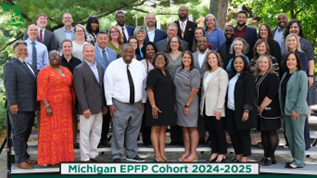
Closing out this year of learning were two capstone experiences designed to let the 2024-25 Fellows advocate for reforms that they care about, display their learning to peers and program sponsors, and plan future growth opportunities – the 2025 Day at the Michigan Capitol and the June 2nd closing session and celebration of Michigan EPFP's 50th anniversary. For the former event, the Fellows gathered on Tuesday, May 13th, for a day of incorporating insights from across the 2024-25 EPFP experience into the pursuit of their education policy goals, cultivating their relationships with Michigan legislators, deepening their understanding of the role of the Senate Fiscal Agency (SFA), considering the function of education associations, and practicing communicating policy perspectives to lawmakers. In addressing these goals, the group met with Kathryn Summers, Director of the SFA, to discuss Michigan’s budget and the role of this organization in appropriations; Morgan Foreman, state representative for Michigan’s 33rd district, to review education policy happenings in the Michigan House and what running for office entails; Dayna Polehanki, state senator for Michigan’s 5th district and Chair of the Senate Education Committee, to cover what to expect from this committee over the next few months; and Hannah Sweeney, Legislative Policy Analyst for the Michigan Association of Superintendents & Administrators (MASA), to share some advocacy strategies and what to expect from the Michigan Legislature regarding education policy this summer. Notably, each of these speakers, except for State Senator Polehanki, was previously a Michigan EPFP Fellow. As such, they also offered the cohort some insights into how this experience readied them for their current work. To conclude this intensive session at Heritage Hall, connected to the Michigan Capitol, a collection of Michigan EPFP Fellows and Co-Coordinators transitioned to the House Chamber to be recognized by Representative Foreman and observe some of this legislative body’s session.
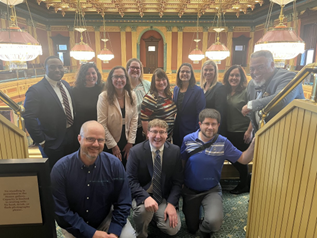
Regarding the program’s closing on June 2nd, the 2024-25 Fellows gathered one last time at the Kellogg Center on MSU’s campus to reflect on their personal and professional growth concerning their pre-EPFP learning objectives; review the links between education policy, leadership, and networking; and establish a vision for the next steps in their professional learning journeys. At this gathering, the Fellows worked through a series of protocols to reflect on their experiences throughout the program year, share their insights, and engage in meaning-making with their peers. They also developed personal professional learning blueprints based on their pre-program learning objectives, growth over the last ten months, and future aspirations. Of course, this session also included some time for the Michigan EPFP Co-Coordinators to honor the program graduates and award them certificates documenting these individuals’ personal investments in advancing Michigan's K-12 and postsecondary education systems for all.
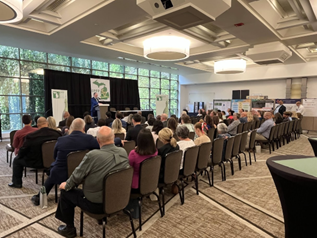
Unique to this year’s 50th iteration of the program, after these elements specific to the 2024-25 cohort on June 2nd, the group moved to a larger space in the Kellogg Center for a full celebration of Michigan EPFP’s golden anniversary with almost 100 alums, Fellows' sponsors, program guests, and K-12 Outreach staff members. After some introductory remarks by Dr. Bryan Beverly, Director of the Office of K-12 Outreach and Michigan EPFP Co-Coordinator, the gathering turned to honoring some essential individuals and organizations in Michigan EPFP’s history. First, Dr. Michael F. Rice, Michigan State Superintendent, received “The Michigan EPFP Leadership Award” for his efforts guiding the Michigan Department of Education (MDE) and the Michigan State Board of Education and “The Michigan EPFP Recognition of 50 Years of Support” on behalf of the MDE for its extensive backing of this program. In accepting these awards, Dr. Rice addressed the audience, reflecting on his leadership in the K-12 space, flagging some policy issues for future leaders to monitor, and calling on EPFP alums to continue their efforts supporting all Michigan students. Then, the Michigan EPFP Co-Coordinators honored Daniel W. Schultz, Senior Policy and Program Advisor for the Office of K-12 Outreach, Michigan EPFP Emeritus Coordinator, and Co-Coordinator of the Global Education Policy Leadership Program, with “The Michigan EPFP Lifetime Service Award” for his decades of program coordination, engagement, and support. Following these recognitions, the event attendees heard from a panel of alums considering Michigan EPFP and education’s future. It included Dr. Yvonne Caamal Canul, former Michigan EPFP Co-Coordinator and former Superintendent for the Lansing School District, Dr. Sue C. Carnell, Chief Deputy Superintendent at the Michigan Department of Education, and Jamey Fitzpatrick, President and CEO of Michigan Virtual. Lastly, the celebration left some time for attendees to mingle and explore the policy poster projects of the 2024-25 graduates – a new program requirement, which had Fellows select an issue of interest and apply their learning to the process of generating a set of policy recommendations.
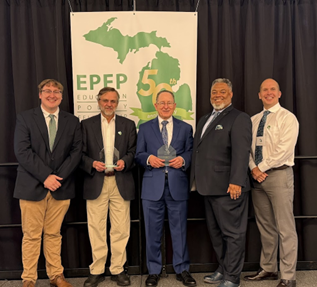
At the end of the program year, the Michigan EPFP Co-Coordinators announced the opening of recruitment for the 2025-26 cohort and the release of next year’s program calendar for Michigan EPFP’s 51st year of learning related to policy, leadership, and networking! As always, prospective Fellows can expect ten months of customized content related to these program pillars, a Regional Leadership Forum in Pennsylvania, a DC field experience focused on federal education policy, a Day at the Michigan Capitol built around state education policy, chances to connect virtually and face-to-face with peers and experts from similar sites across the country, and opportunities to engage in a collaborative Learning Team presentation and individually-driven poster project. Interested parties should apply online by Friday, August 1st. Individuals wanting more information can visit the EPFP website, watch this overview video, review the 2025-26 program calendar, or email one of the Michigan EPFP Co-Coordinators.
Relatedly, EPFP alums who are intrigued by the possibility of building on their past experiences can apply for the (new to Michigan Fellows) 2025-26 Advanced Education Policy Leadership Program (AEPLP) by Friday, August 1st. This multistate professional learning opportunity will provide past Fellows from Michigan and similar sites in Kansas/Missouri, Minnesota, New York, Ohio, and Pennsylvania the chance to network with peers and coordinators from other states, compare education policy in different contexts, learn from thought leaders in this space, and generate insights to take back to their workplaces. It includes a two-day, in-person Symposium at the Melrose Georgetown Hotel in Washington, DC, to kick off the program year, as well as eight subsequent virtual sessions from October 16th to April 30th, covering essential skills and core education policy issues. In this case, individuals with questions should email Tyler Thur, AEPLP and Michigan EPFP Co-Coordinator, at thurtyle@msu.edu.
